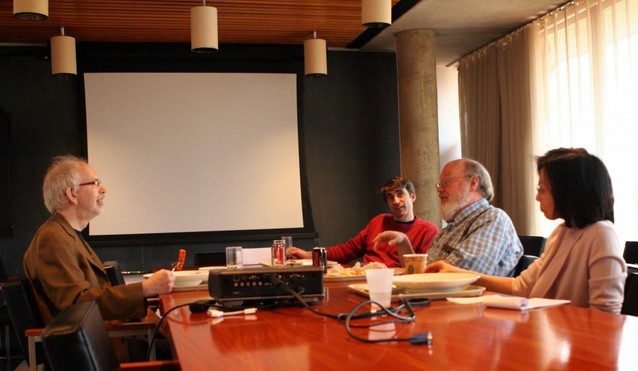ELSI Blog
32 IPA@IAS
The meaning of today's cryptic title, IPA@IAS, may be difficult to guess. IPA here does not stand for Indian Pale Ale, a particularly tasty type of beer, but rather for "Interdisciplinary Perspectives on Abiogenesis", where "abiogenesis" literally means "life originating from non-life" (as opposed to the usual way in which an organism is born from another organism). IAS stands for "Institute for Advanced Study", where one of the two US-based ELSI satellite programs is based. These two are my Program in Interdisciplinary Studies at IAS and the Origins of Life Initiative at Harvard.
Now the combination IPA@IAS points to informal weekly lunches that Jim Cleaves and I have been organizing at IAS on the general theme of Origins of life, since January this year, one month after ELSI was founded. Jim, an associate professor at ELSI, divides his time between ELSI and IAS. And since early this month, we have been assisted by Yuka Fujii as well, a research scientist at ELSI; she also divides her time between ELSI and IAS.
These IPA@IAS lunches are very informal affairs, as Albert Fahrenbach already mentioned in his previous blog post. We do not use any slides or other audiovisual aids, but good old traditional chalk and blackboard use is allowed and encouraged. We all sit around a single long table, in a room just off the dining hall. After carrying our trays from the kitchen to this room, we chat for a while without any structure, and then one designated moderator kicks off the discussion with a topic of his or her choice. Examples of the most recent topics are "From Life to LUCA" (Greg Fournier, MIT); "Non-Equilibrium Processes and Their Role in the Origin of Life" (Albert Fahrenbach, ELSI/Harvard); "Biomarkers for Observations of Exoplanets" (Yuka Fujii, ELSI/IAS). Soon we will hear "Is it necessary to understand the origin of life as a cascade of non-equilibrium phase transitions?" (Eric Smith, George Mason Univ.) and "The Homochirality Question" (Marcelo Gleiser, Dartmouth).
The typical audience is as interdisciplinary as my program. For example, when Albert gave his talk two weeks ago, we had ten participants: three astrophysicists, two chemists, one condensed matter physicist, one mathematician, one computational neuroscientist, one educational professional, and one Hollywood screenwriter (Nickolas Barris, an IAS Director's visitor who will lead a discussion on "Scientific Imagination and the power of Hollywood Visualization" during our IPA lunch on November 14).
We decided to run our IPA lunches for two months each semester: October and November; and February and March. It is our experience that most members and visitors at IAS are more relaxed and more likely to attend `fun' interdisciplinary events earlier on in each semester. Later they tend to realize that they haven't completed the book project or some other activity which had been their mean goal, and they then are more likely to spend more time in their own offices. So if you find yourself in or near Princeton, on a Thursday around lunch time in Feb/Mar/Oct/Nov, by all means come join us!












